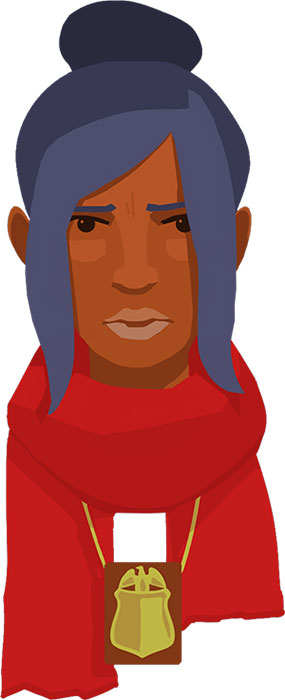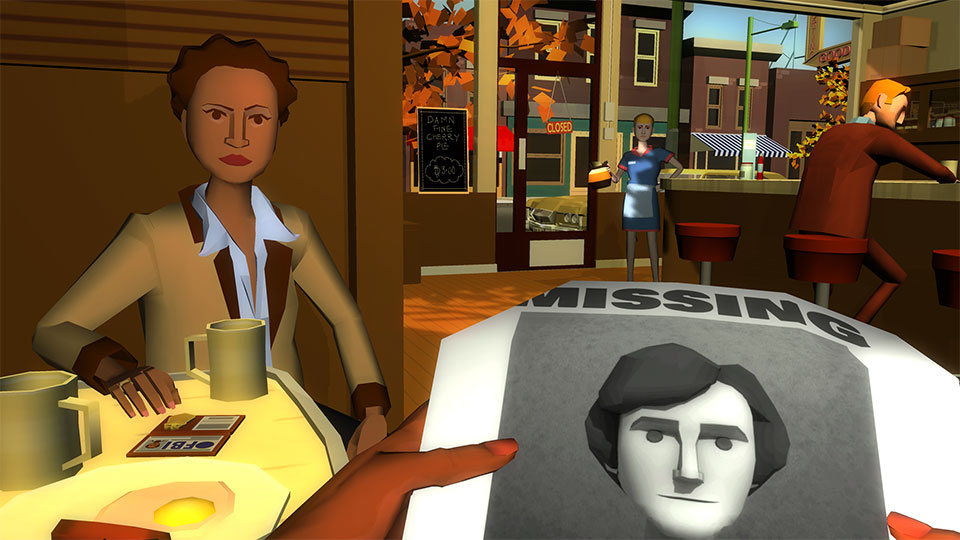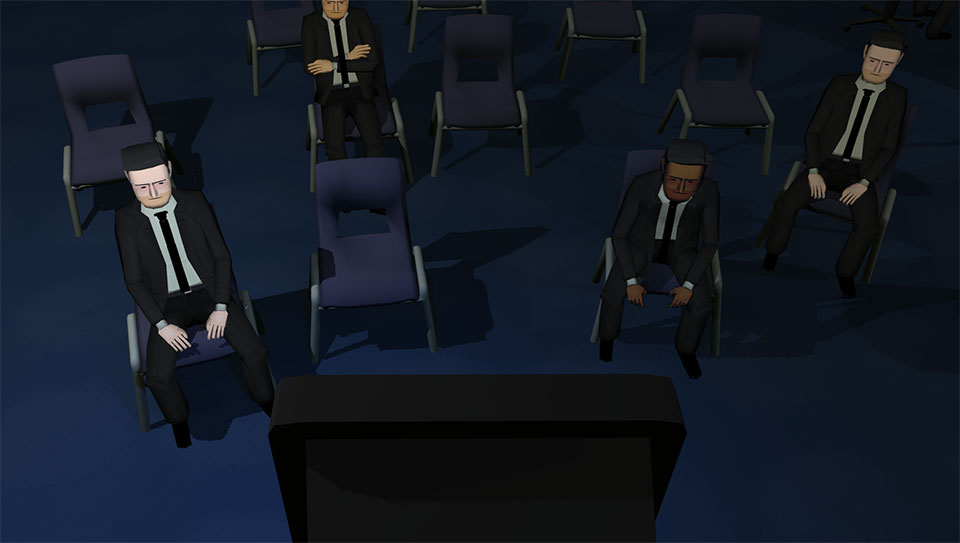 Virginia seems like a first person exploration game, but, could you explain us more about the gameplay? Being an FBI agent, what about interrogations, investigation, et cetera? Absolutely. So we’re very intentionally keeping the game mechanics quite lean to focus on the story and on the delivery of the story. It isn’t a game about roleplaying as a detective in the same way as something like LA Noire. Although we will feature moments of FBI investigative work, they will mostly be framed to serve the drama and delivered in a very bespoke way. The game will involve embodying and experiencing the story through the eyes of our main character. And the player will transition through a series of scenes, which they will be a participant in. So you’ll move through the environment, you’ll engage with characters and items. You’ll absorb the story passively through incidental details and the sound design. You won’t passively be watching a cutscene occur around you though. Your direct interaction will be necessary to push the story forward. In The Vanishing of Ethan Carter, the debut game from The Astronaus, «as a detective with the supernatural ability to visualize scenes of lethal crimes, you investigate the kidnapping of a young boy, hoping to save him before it’s too late». Your game also features a missing young boy. How are you approaching the missing boy trope in your story? I noticed that Adrian Chmielarz had made that association too:
Virginia seems like a first person exploration game, but, could you explain us more about the gameplay? Being an FBI agent, what about interrogations, investigation, et cetera? Absolutely. So we’re very intentionally keeping the game mechanics quite lean to focus on the story and on the delivery of the story. It isn’t a game about roleplaying as a detective in the same way as something like LA Noire. Although we will feature moments of FBI investigative work, they will mostly be framed to serve the drama and delivered in a very bespoke way. The game will involve embodying and experiencing the story through the eyes of our main character. And the player will transition through a series of scenes, which they will be a participant in. So you’ll move through the environment, you’ll engage with characters and items. You’ll absorb the story passively through incidental details and the sound design. You won’t passively be watching a cutscene occur around you though. Your direct interaction will be necessary to push the story forward. In The Vanishing of Ethan Carter, the debut game from The Astronaus, «as a detective with the supernatural ability to visualize scenes of lethal crimes, you investigate the kidnapping of a young boy, hoping to save him before it’s too late». Your game also features a missing young boy. How are you approaching the missing boy trope in your story? I noticed that Adrian Chmielarz had made that association too:"Uncover the mystery surrounding the disappearance of a young boy". Hmm… 🙂 Looks interesting! http://t.co/X2E3wa0pym
— Adrian Chmielarz (@adrianchm) julio 2, 2014
That’s a very flattering comparison. We absolutely adore Brendon Chung’s Thirty Flights of Loving at Variable State. In fact I think it’s only right we acknowledge that it’s probably our foremost inspiration. We were really impressed with how that game managed to evoke such a broad range of emotions, the kind of emotions you don’t typically expect to feel playing a game, and do it so efficiently, so elegantly. If we can even achieve a fraction of what that game did then I will be happy. It’s also fair to say that our game would compare to other first person adventure games like Gone Home or Dear Ester too. How’s working with Lyndon Holland? How did you meet? So very early on in development Terry and myself realised that music and sound design would play a pivotal role in conveying the emotion and drama of the game. We know next to nothing about sound design ourselves. So we decided to try putting out an advert on websites like TIGSource and Reddit. We only expected to get back a couple of replies. But within a week we had well over 50 applicants. And the quality overall was just incredible. These were people ranging from hobbyists to university graduates to sound designers with decades of Hollywood experience. And they were all amazing. So we took our time and painstakingly listened to every portfolio. And after a kind of interview process with our select few favourites we ended up choosing to work with Lyndon. And luckily for us he agreed! Lyndon’s incredibly talented and his work on the project extends beyond the sound into involvement with level design and writing. He’s a really likeable, really smart guy. And his passion has been truly infectious. We couldn’t be more excited to work with him.
Variable State was founded in January but you and Terry have worked for a decade in some big studios —I’m reading Rockstar, Rare and Electronic Arts. Would you say that Virginia is influenced by your work on those studios, or are you aiming to do something completely different? Something completely different. That isn’t to say I resent the opportunities working at those studios have given me. I’ve met some unforgettable, brilliant people at those companies. And learned everything I know about game production and delivery. But I guess, and I can only speak for myself here really, I had become frustrated working on large projects which weren’t necessarily a reflection of my tastes and interests. I wanted to make something personal. You founded Variable State after you left DeepMind Technologies, an artificial intelligence company. How was the transition from video games to AI? Did you leave before or after Google bought the company? Unfortunately there’s only so much I can talk about DeepMind as I’m still under NDA. I can confirm we both left before the Google acquisition. I will say it was an incredible company to work for, to have the opportunity to meet Demis Hassabis and Shane Legg and be exposed to a research and development culture like DeepMind’s. I am hugely grateful for that opportunity. And I absolutely wish them the very best for the future.  Speaking of AI, somehow I’ve created a link between that and The X-Files —I’m thinking about that episode written by William Gibson, Kill Switch. How has AI and your non-video game related work may influence (and enrich) the development of Virginia? It’s funny you should mention Kill Switch. I was talking with Terry about that episode just the other day. Terry’s a big William Gibson fan and often suggests I read the Sprawl trilogy. I have Neuromancer on my desk, ready to go. I must make time for it soon. But regarding influences, AI or otherwise, I just hope that as we’re only a small team working on Virginia that the game will be a reflection of who we are as authors. That it will be a distillation of mine, Terry’s and Lyndon’s interests and our personalities and dispositions. And that our interests in culture and art, especially those interests beyond games, will be incorporated into the game. Consciously or subconsciously, for better or worse. I ask about outside influences because sometimes video games seem too «game-y» —too shy to deal with some topics, too fixated on rule-driven, sword-and-sorcery, not-so-narratively-interesting fantasy worlds. I had the opportunity to hear two talks from Tim Schafer and Rami Ismail last week and both told to find interesting ideas and inspiration everywhere: skydiving, reading novels, going to museums, traveling. Would you say we still err in being a little close-minded and not accepting a more diverse approach to our medium? Yes, I think mainstream games are very myopic in their inspirations. And I think that’s because of commercial risk. When a mainstream video game costs many millions of dollars to produce and requires hundreds of people to develop, inevitably there will come a need to justify that investment and mitigate any risk that investors won’t see a return. And when you’re at a planning stage the only way to provide a convincing argument that you’re mitigating risk is by quoting precedent. To say I’m making a game which is like this previous game which did well. Or which is based on some other media which was financially successful. And inevitably that leads to derivative content. Games which are just small iterations or adaptions of previously existing games.
Big money is what stifles creativity. And in part that’s what’s so appealing about going indie. That your up front costs can be smaller. That you don’t need to generate huge revenue to be self-sufficient.
And also that you’re fewer people to persuade. Your arguments are easier to win. There’s less inertia when it comes to changing course or reacting to problems. You can take the creative risks and hopefully are freer to make games which are original and can draw their inspirations from culture and experiences beyond games.
Speaking of AI, somehow I’ve created a link between that and The X-Files —I’m thinking about that episode written by William Gibson, Kill Switch. How has AI and your non-video game related work may influence (and enrich) the development of Virginia? It’s funny you should mention Kill Switch. I was talking with Terry about that episode just the other day. Terry’s a big William Gibson fan and often suggests I read the Sprawl trilogy. I have Neuromancer on my desk, ready to go. I must make time for it soon. But regarding influences, AI or otherwise, I just hope that as we’re only a small team working on Virginia that the game will be a reflection of who we are as authors. That it will be a distillation of mine, Terry’s and Lyndon’s interests and our personalities and dispositions. And that our interests in culture and art, especially those interests beyond games, will be incorporated into the game. Consciously or subconsciously, for better or worse. I ask about outside influences because sometimes video games seem too «game-y» —too shy to deal with some topics, too fixated on rule-driven, sword-and-sorcery, not-so-narratively-interesting fantasy worlds. I had the opportunity to hear two talks from Tim Schafer and Rami Ismail last week and both told to find interesting ideas and inspiration everywhere: skydiving, reading novels, going to museums, traveling. Would you say we still err in being a little close-minded and not accepting a more diverse approach to our medium? Yes, I think mainstream games are very myopic in their inspirations. And I think that’s because of commercial risk. When a mainstream video game costs many millions of dollars to produce and requires hundreds of people to develop, inevitably there will come a need to justify that investment and mitigate any risk that investors won’t see a return. And when you’re at a planning stage the only way to provide a convincing argument that you’re mitigating risk is by quoting precedent. To say I’m making a game which is like this previous game which did well. Or which is based on some other media which was financially successful. And inevitably that leads to derivative content. Games which are just small iterations or adaptions of previously existing games.
Big money is what stifles creativity. And in part that’s what’s so appealing about going indie. That your up front costs can be smaller. That you don’t need to generate huge revenue to be self-sufficient.
And also that you’re fewer people to persuade. Your arguments are easier to win. There’s less inertia when it comes to changing course or reacting to problems. You can take the creative risks and hopefully are freer to make games which are original and can draw their inspirations from culture and experiences beyond games. 
You’re from London, right? How’s depicting such a non-familiar place as the South Atlantic region of the US for a work of fiction? How’s the documentation process for that? It’s something I’m very self-conscious of, to be honest. Both me and Lyndon are English and live in London. Terry is Irish and lives in Dublin. Although some of us have visited the South Atlantic States, I’m very aware we don’t have that instinctive cultural awareness that a Virginia-born person or even an American might have. So we’re making sure are thorough in our research. And when the time is right we will absolutely look to consult with contacts we have who are from the States and from Virginia specifically. But I think it’s important that we make clear that our game isn’t so much about the real world Virginia as it is about the abstracted, fantasy Virginia we’ve created based on the television which has inspired us. Our Virginia will be exaggerated and strange and will naturally have its own eccentricities and anomalies which result from it being realized by three non-Americans. I hope people warm to and enjoy those oddities, rather than choose to criticize them. But we’ll absolutely do our best to be responsible with the writing and endeavor not to unwittingly upset or offend anyone. That made me think of True Detective, as well as some other classic mythical reinterpretations of real American places. Obviously David Lynch comes to my mind here. What do you think America has to stimulate all these kinds of specific types of stories? What about Europe, why aren’t there so many games set on post-World War II Europe? I think in the English speaking world, even across Western Europe, our media has a very ethnocentric leaning toward American culture. Probably for commercial reasons – that it’s a large audience to appeal to if you’re undertaking a commercial enterprise. And because an order of magnitude more material is produced in America than elsewhere in the world. That’s perhaps less true outside of games. But I do agree that there is a significant bias in games towards fictions which feature American characters or are set in American locations. Or that derive from American media in other formats, particularly films. We’re totally guilty of that ourselves.
I remember how refreshing it was to play Dear Esther the first time and experience a game set in the contemporary British Isles. It produced a really visceral twinge of nostalgia for family holidays I used to take to the West Highlands of Scotland. And I can imagine it offered a unique and intriguing experience for players unfamiliar with the culture of the UK.
I genuinely hope this changes over time; that we see more diversity in the cultural inspirations for games. And I would certainly be interested someday exploring a game design which had a grounding in a culture more personal to myself. 



Solo los usuarios registrados pueden comentar - Inicia sesión con tu perfil.